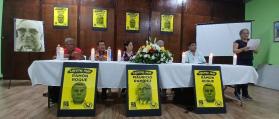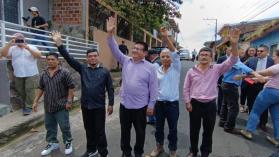Fifteenth Anniversary for Peace Accords: Moment for Reflection More Than Celebration
January 2007 El Salvador Watch
On January 16, El Salvador celebrated the 15th anniversary of the signing of the Peace Accords between the government and the FMLN, which ended the countrys 12 year civil war. Officially, the main achievements of the Peace Accords were the end of the armed conflict, the recognition of the FMLN as a political party, and the dismantling of the military structures utilized to repress the people of El Salvador.
However, many people are asking whether or not this anniversary truly warrants a celebration, given that the Salvadoran government has refused to fulfill many of the agreements, and, more importantly, that violence, crime, impunity, and repression are all on the rise. These factors have created a social and political climate reminiscent of the decades leading up to the armed conflict. Furthermore, right wing political forces have refused to allow the truth to come out about the grave human rights violations that occurred during the war. At the same time, the nature and functioning of the current National Civilian Police is increasingly militaristic, the old structures of repression are being reactivated, and the right wing has created the tools to legally repress organization and mobilization in the country.
Current Context: Violence and Difficult Living Conditions
Salvadorans today are suffering through the very social, economic and political conditions that the Peace Accords were meant to alleviate. There have been few advances in the process of democratization, as political and economic power are still in the hands of the same small group. In order to maintain its power, this oligarchy has control of the mainstream media, the police, the military and the justice system.
Economically, the neoliberal policies of the oligarchy have forced more than 2.5 million Salvadorans out of the country, mainly to the United States. More people have left El Salvador during the period of "peace" since 1992 than during the entire armed conflict. Remittances continually increase, totaling more than 2.7 million dollars annually. That money sent home not only sustains a large percentage of Salvadoran families that depend on it to survive, but it has also created a highly lucrative system for the same financial oligarchy that controls the government.
Furthermore, Salvadorans are facing increasing violence, measured by everything from the national homicide rate to domestic violence. There are, on average, 13 murders every day in El Salvador, concentrated mainly in the 20 municipalities with the highest population. The government of President Antonio Saca has deliberately failed to create or implement solutions to the increasing crisis of violence, instead making superficial changes to the cabinet and periodic publicity stunts that aim to create the false perception that the ARENA party is addressing the crisis.
In addition, ARENA leaders have continued their campaign to criminalize and thwart organization and mobilization of the Salvadoran left. The recently-approved Law against Acts of Terrorism penalizes the simulation, preparation, financing and organizing of any mobilizations and other acts of protest. In the last plenary of the year in the Legislative Assembly, the right wing factions approved the Anti-Organized Crime Law, which was highly criticized and voted against by the FMLN deputies for its repressive and arbitrary nature. ARENA also continues to attack the FMLN in the media, worried already about a victory for the left in the 2009 presidential elections.
Regressions in the Peace Process
Repression and impunity continue to reign in El Salvador. Leaders and members of the social movement have been captured and disappeared in the style of civil war era death squads, and these cases are causing alarm in the Salvadoran left. At many protests, the presence of riot police surpasses that of protesters, which is not only unconstitutional but also a return to the repression that forced the organized population to armed struggle. The repression against the student movement, especially since a violent confrontation on July 5, 2006, has been serious. Furthermore, ARENA used the violence to justify the passing of its Anti-Terrorist Law.
According to evaluations of the Peace Accords by progressive Salvadoran think tanks like FESPAD (Foundation for the Study and Application of Law), there are many resolutions within the Peace Accords that have not been fulfilled by the government. One important agreement is about the nature and function of the National Civilian Police (PNC). The PNC today is mainly comprised of former military and police personnel who were tied to the military governments of the 1980s, despite the intention of the accords to de-politicize the police
In addition to the military nature of the PNC, the Armed Forces are regaining their presence in both the rural and urban sectors of the country, justified by the under-funding of the police and the increase of violence. Almost seven years ago, the government of El Salvador approved and ratified a cooperation agreement with the government of the United States related to the military use of Salvadoran airport installations, supposedly as part of the drug war. The agreement allows for U.S. military personnel to function there, even though the Peace Accords stipulate that all security is the exclusive responsibility of the PNC. This military base not only marks U.S. military and political intervention in El Salvador, but also works in conjunction with the International Law Enforcement Academy (ILEA). Resistance to the ILEA in El Salvador has been strong from the social movement and the FMLN, which maintain that the academy is a violation of national sovereignty and a corresponding institution to the infamous School of the Americas.
In its final report, the U.N. Truth Commission, established as part of the peace process, verified the existence of a clandestine system of repression organized by military leaders and wealthy civilians during the war. The repressive system worked to disappear and murder political opposition activists through death squads. Despite the Peace Accords, the death squads were never investigated or dismantled, and their members were not brought to justice, mainly because of the political power of their financiers and leaders, amongst them the founder of the ARENA party, Roberto DAubuisson. As a result, impunity has allowed for these practices to resurface.
Unresolved Political Murders Lead to More Impunity
Currently, there are unresolved cases of political assassinations such as that of union leader Gilberto Soto in October 2004 that have revived fear amongst the left of the persistence of political murders in El Salvador. Beatrice de Carrillo, the nations Human Rights Ombudswoman, presented an extensive report on the Soto case, in which she concluded that death squads continue operating in El Salvador. To this day, the presidency and the judicial system have prevented any true investigation of the case.
More recently, the political assassinations of Francisco Antonio Manzanares and Juana Monjaras de Manzanares, parents of former Radio Venceremos host Marina Manzanares- also known as "Mariposa"- have again presented evidence of the existence of death squads. In her international campaign to bring light to the case, Mariposa has explained that prior to their murder, in March and April 2006, her parents received various death threats by telephone and in person. However, the judicial system and the PNC remain silent and have not moved forward with the investigation of the case. Mariposa believes that their refusal to investigate serves to protect members of the ARENA party or representatives of the State Intelligence Office. Mariposa also points out that the political assassination of her brother, Paco Cutumay, occurred in 1993 when the PNC was under the direction of Rodrigo Avila, while the murder of her parents took place with Avila again at the helm of the PNC.
Considering the economic, social and political crisis El Salvador is suffering at the moment, the 15th anniversary of the Peace Accords serves as an opportunity for the Salvadoran left to demand that the Peace Accords be respected. In order for there to be real peace, the assassins who continue to govern the country will need to be brought to trial and sentenced. In a country where on average 13 people are murdered daily, where the costs of living require six or seven minimum wage salaries per household to live in dignified conditions, where impunity remains the most efficient means for the right to maintain its neoliberal model and repress any group that demands a change, we cannot celebrate this anniversary without the implementation of a real agenda for comprehensive peace!

 "I am a CISPES supporter because continuing to fight for social justice and a more people-centered country means continuing the dream and sacrifice of thousands of my fellow Salvadorans who died for that vision.” - Padre Carlos, New York City
"I am a CISPES supporter because continuing to fight for social justice and a more people-centered country means continuing the dream and sacrifice of thousands of my fellow Salvadorans who died for that vision.” - Padre Carlos, New York City

